

Parent can use the concept adopted by Skinner, using reinforcement, punishment, or a mixture of both. When we are helping to decrease the frequency of a child’s negative behavior, having reinforcement or punishment methods in our toolkit can help a parent to implement the desired behavior. Reinforcement Vs Punishment parents.
Negative Reinforcement. The Use of Reinforcement and Punishment in Shaping a Child's Behavior. What Is Reinforcement? Psychology, Definition, And Applications. By: Toni Hoy Updated February 11, 2021 Medically Reviewed By: Whitney White, MS.

CMHC, NCC., LPC Reinforcement psychology is the study of the effect of reinforcement techniques on behavior. Positive Parenting Strategies For The Teenage Years. Real-Life Examples of Positive Punishment. “Positive” and “punishment” seem like two words that you wouldn’t use together.
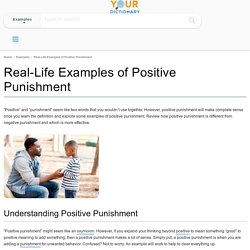
However, positive punishment will make complete sense once you learn the definition and explore some examples of positive punishment. Review how positive punishment is different from negative punishment and which is more effective. Understanding Positive Punishment “Positive punishment” might seem like an oxymoron. However, if you expand your thinking beyond positive to mean something “good” to positive meaning to add something, then a positive punishment makes a lot of sense. Positive vs Negative Punishment - Psychestudy. Punishment is a fundamental concept of Operant Conditioning, whose major objective is to decrease the rate of certain undesired behavior from occurring again.
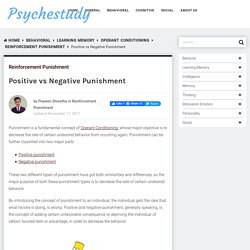
Punishment can be further classified into two major parts These two different types of punishment have got both similarities and differences, as the major purpose of both these punishment types is to decrease the rate of certain undesired behavior. By introducing the concept of punishment to an individual, the individual gets the idea that what he/she is doing, is wrong. How Negative Punishment Works. Negative punishment is an important concept in B.
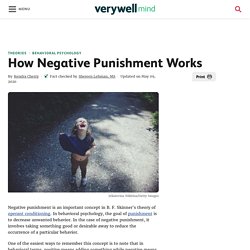
F. Skinner's theory of operant conditioning. In behavioral psychology, the goal of punishment is to decrease unwanted behavior. In the case of negative punishment, it involves taking something good or desirable away to reduce the occurrence of a particular behavior. One of the easiest ways to remember this concept is to note that in behavioral terms, positive means adding something while negative means taking something away. Parents influence on child behaviour.
How Do You Handle Teenagers? Positive Reinforcement - The Big Bang Theory. The Influence of Parents on Teenagers is Real. And More Than You Think. Who Matters to Teens?

Parents Matter! As a parent, you matter more to your children than anybody or anything else in their lives. Too many parents underestimate the influence and impact they have in their tweens’ and teens’ lives. It is critical that you understand how much you do matter, otherwise you may miss the opportunity to shape your child’s future and keep him or her safe today. A Parent's Influence - CBN.com. CBN.com “He never listens to me.”
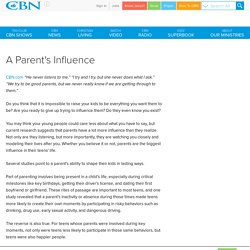
“I try and I try, but she never does what I ask.” “We try to be good parents, but we never really know if we are getting through to them.” The Influence of Negative and Positive Parenting on Children. A child’s behavior is often a reflection of his parents and the treatment meted out to him at home.
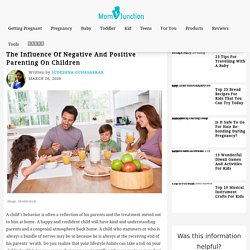
A happy and confident child will have kind and understanding parents and a congenial atmosphere back home. A child who stammers or who is always a bundle of nerves may be so because he is always at the receiving end of his parents’ wrath. Do you realize that your lifestyle habits can take a toll on your child’s health? Are you aware that your constant tiffs with your partner may dent your child’s confidence and his outlook towards relationships for life? Parents are role models for their children.
Operant Conditioning. Insight of Skinner Reinforcement Theory.